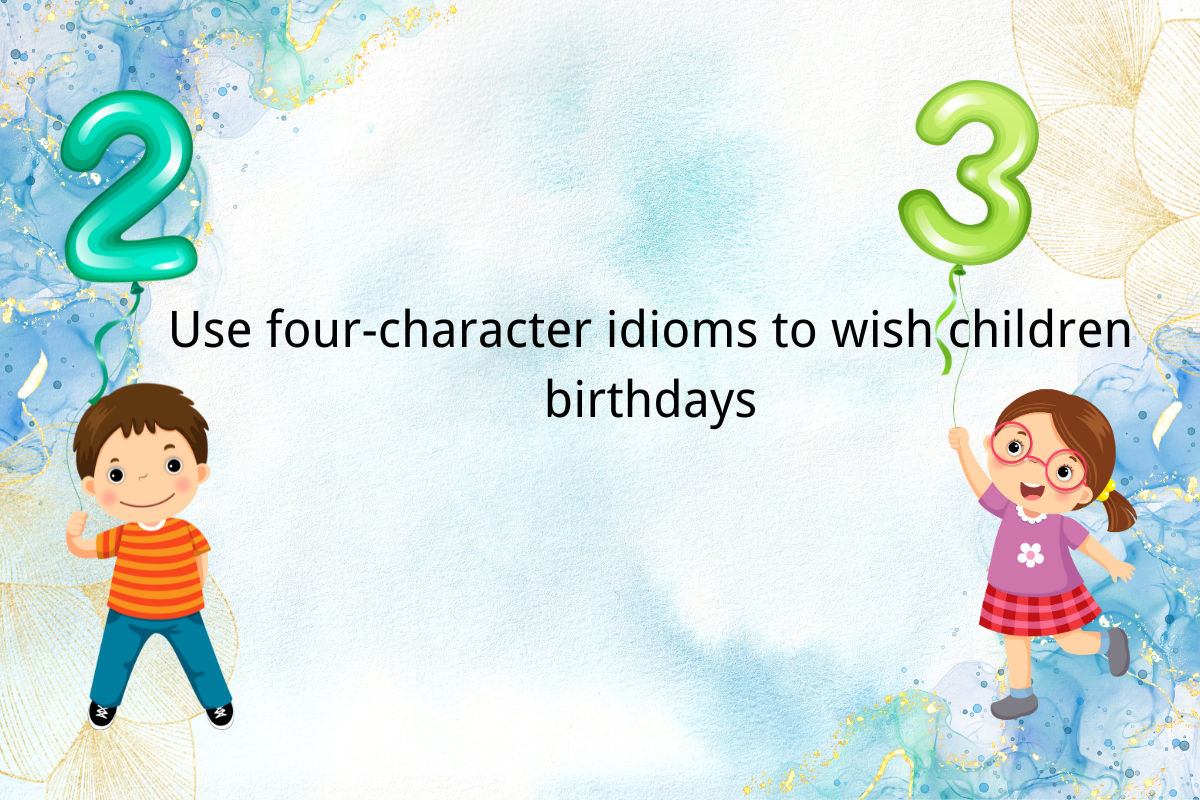Use Four-Character Idioms to Wish Children Birthdays (Part 1)
In the realm of Chinese culture, the beauty and depth of language are often encapsulated in four-character idioms. These idioms not only convey profound meanings but also carry wishes and blessings. When it comes to celebrating children's birthdays, using four-character idioms adds a touch of traditional charm and cultural richness to the occasion. Let's explore two delightful idioms—“童真无邪” (tóng zhēn wú xié) and “童趣盎然” (tóng qù àng rán)—and discover how they infuse birthday wishes with innocence and joy.

童真无邪 (tóng zhēn wú xié): Innocence and Purity
In Chinese culture, children are often regarded as embodiments of innocence and purity. The idiom "童真无邪" perfectly captures this essence. It reflects the pure and untainted nature 自然 (zì rán) of children, free from worldly concerns and biases. When we wish a child "童真无邪" on their birthday, we are expressing our hope that they maintain their innocence and purity as they grow older, embracing life with an open heart and a clear conscience.
自然 (zì rán), noun, nature
Examples:
- The beauty of nature always inspires me to explore more.
大自然的美丽总是激励我去探索更多。
dà zì rán de měilì zǒng shì jīlì wǒ qù tànsuǒ gèng duō. - I love nature very much.
我很喜欢大自然。
Wǒ hěn xǐhuān dà zìrán.

童趣盎然 (tóng qù àng rán): Joyful and Lively
Children possess an innate curiosity and zest for life, making every moment filled with joy and excitement. The idiom "童趣盎然" encapsulates this lively and cheerful spirit of childhood. It describes the scene where children's laughter resonates, their eyes sparkle with excitement, and their hearts brim with joy. When we use this idiom to wish a child "童趣盎然" on their birthday, we are celebrating their exuberance and zest for life, wishing them a future filled with endless happiness and adventures.
Why Chinese people like these words
Chinese people love using the idioms "童真无邪" (tóng zhēn wú xié) and "童趣盎然" (tóng qù àng rán) because they vividly depict the curiosity and vitality inherent in children. In Chinese culture, children 孩子们 (hái zǐ men) are seen as the most wonderful and lively stage of life, filled with curiosity and enthusiasm for the world. Everywhere, there are scenes brimming with joy and surprises. Therefore, when we wish children a happy birthday, we are actually expressing our heartfelt wishes for their lives to be filled with joy and vitality, hoping that their lives will be full of endless happiness and excitement.
孩子们 (hái zǐ men), noun, children
Examples:
- The children are playing in the park.
孩子们在公园里玩耍。
hái zǐ men zài gōng yuán lǐ wán shuǎ. - These children are very happy.
这些孩子们非常快乐。
zhè xiē hái zǐ men fēi cháng kuài lè.
Key Sentences:
- The children's smiles are full of innocence and purity.
孩子们的笑容充满了童真无邪。
Háizimen de xiàoróng chōngmǎnle tóng zhēn wú xié. - Seeing the innocent and pure look in the children's eyes, I feel warm inside.
看到孩子们天真无邪的眼神,我感到心里暖暖的。
Kàn dào háizimen tiānzhēn wú xié de yǎnshén, wǒ gǎndào xīnlǐ nuǎnnuǎn de. - The children playing in the garden create a scene full of joy and vitality.
孩子们在花园里玩耍,场面童趣盎然。
Háizimen zài huāyuán lǐ wánshuǎ, chǎngmiàn tóng qù àng rán.